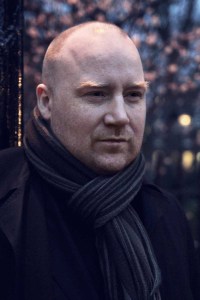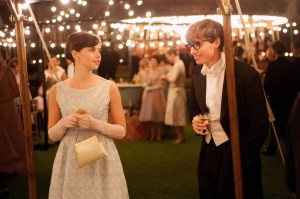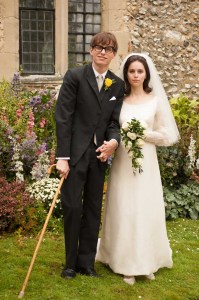
The score for The Theory of Everything, composed by Jóhann Jóhannsson, is perfectly tuned to the subject matter of the film. From the haunting piano and heavenly celeste, to the melodic theme that weaves throughout the narrative, the music creates a sense of wonderment that captures the essence of the life of Stephen Hawking (Eddie Redmayne) – his rapture with the mystery, beauty and poetry of the universe.
Jóhannsson met director James Marsh at the premiere of the Danish documentary The Good Life that Jóhannsson had scored. The director knew the composer’s music from that film as well as his albums. Five years later, Jóhannsson got the call about The Theory of Everything.
“I was hugely excited because, like everybody, I was fascinated by Stephen Hawking as a character and his work,” Jóhannsson said. “I thought it would be an amazing story to film. The combination of that story with James as a director, whose work I had admired for a long time since Man on Wire and his early documentaries like Wisconsin Death Trip.”

The process Jóhannsson employs for composing a score usually begins with getting to know the project – reading the script, seeing a rough cut and discussing the film with the director. “A lot of it is about getting to know the director and his ideas for the film, his vision,” explained Jóhannsson. “It’s about watching it over and over again, trying to become as familiar with the material as you possibly can, because you’re working with people who have been working on the project for months or sometimes years. They are intimately familiar with every single aspect of it.”
Although Hawking’s personal taste in music leans towards classical composers such as Wagner, Jóhannsson and Marsh never considered that approach. They did not want to tie the music down to a certain time. Because of the three-decade scope of the film, the music had to have timelessness, while hitting the emotional and story beats. The music needed to be varied and work in all these contexts, but still have a unifying thread.
Jóhannsson feels he was in a privileged position coming late to the project at a point when he could build upon the brilliant work of the other filmmakers and write music inspired by the images and performances. “That is really the material that I work from to start creating a score,” he explained. “Then it’s a matter of sending in some ideas to see what connects with the director. It’s just like a dialog. It’s a collaboration. You massage it into shape. You slowly find a voice, a sound or a melody, a feeling or a mood that works for a particular scene.”
 Piano was the primary instrument used in the score, but Jóhannsson also used the celeste, which is played by a keyboard. Similar to a glockenspiel, the celeste has a much softer, subtle timbre. “It’s the music of the firmament,” Jóhannsson said. “It’s the stars that are sparkling and the mystery and the wonder of the open sky.”
Piano was the primary instrument used in the score, but Jóhannsson also used the celeste, which is played by a keyboard. Similar to a glockenspiel, the celeste has a much softer, subtle timbre. “It’s the music of the firmament,” Jóhannsson said. “It’s the stars that are sparkling and the mystery and the wonder of the open sky.”
Jóhannsson starts by composing significant scenes. In the case of The Theory of Everything, he started with the opening scene intro, which set the tone for the whole film and turned out to be one of his favorite pieces. The scene needed a driving piece with rhythmic, kinetic energy to reflect the vigor and joy of the young Hawking cycling through Cambridge.
“That piece of music came very early on,” revealed Jóhannsson. “The four-note piano motif that begins the film, is the first sound you hear and continues throughout this cue. It is then layered with harmonies and other orchestral motifs that answer the piano and create layers of patterns that evolve and transform and grow, finally exploding into a kind of Big Bang that opens up the film.”





